Personalities
 |
 |
 |
 |
 |
 |
 |
Heroes of La Vendée - I
Henri de la Rochejaquelein Enters the Fight
In the year 1772, at the ancestral Castle of Durbelières near Châtillon-sur-Sèvre in Poitou, France, was born Henri de la Rochejaquelein. His father was a colonel in the royal Polish artillery, and had no prouder ambition for his son than that he should likewise be a soldier.
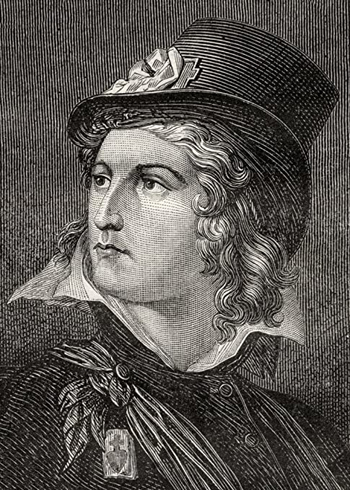
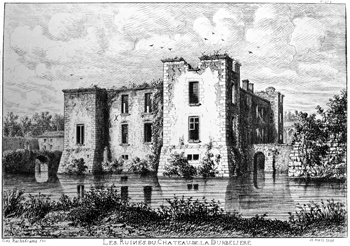 So Henri was early sent to the military school at Soréze to be taught the arts of war and the whole system of military tactics. At this time he is described as a slight, soldierly and graceful youth. His frank and gentle face was strongly marked by the innate nobility of his soul, no less than by the outward tokens of that nobility to which the accident of birth entitled him.
So Henri was early sent to the military school at Soréze to be taught the arts of war and the whole system of military tactics. At this time he is described as a slight, soldierly and graceful youth. His frank and gentle face was strongly marked by the innate nobility of his soul, no less than by the outward tokens of that nobility to which the accident of birth entitled him.
His eyes were the most remarkable feature of his face: dark, and yet intensely bright, bright with that immortal spark that urged him to his high destiny of fame and early death.
He was then 16 years of age, and time had dealt gently with him. He chased the deer through the green forests of his native Poitou, beside her winding streams and over her broad fields, while friends and comrades looked with envy upon his skilful horsemanship, for which he was even then remarkable.
But the smiling landscape passed from sight. A day of horror had come for France. The leaders of the Revolution had unleashed their bloodhounds, who, fiercely following the scent, rushed abroad through the verdant fields, the pleasant homes and kingly palaces of regal France.
Thus did the terrible storm overshadowing his native land draw Henri de la Rochejaquelein forth from childhood's green and sheltered places to take his rank among its foremost defenders. The life of the King was already threatened, and our hero, inspired with the loyalty which had come down to him amongst the heirlooms of his race, hastened to Paris to enroll himself in the Constitutional Guard. But the awful 10th of August came, when Louis, who had still some faithful arms to strike a blow for God, for King and for country, gave himself up by an act of misplaced confidence, with his wife, children and attendants, into the hands of the National Assembly.
"I am come into your midst," he said, " to prevent a great crime." Alas! he could not foresee the future, when the sin of regicide would call down a deeper vengeance upon their heads. Needless to dwell upon these harrowing scenes; the poor King's trust in the affection of his people; his grief and regret when he heard a discharge of artillery directed against that cruel mob which 24 hours later condemned him, with his wife, children, and his sister, Madame Elizabeth, to the prison of the Temple. ...
Here, then, was a touching appeal to chivalry, and la Rochejaquelein felt that he must stand among the few loyal ones that formed an outwork round the King.
In Paris, however, his presence was of no avail, and so the young hero returned to Poitou, crying: "I go to my native province, whence they shall hear of me before long."
A prophetic warning
Meanwhile we shall glance at the origin of this struggle and the causes for the deep loyalty of the people of La Vendée.
The lords and commons of these Western provinces of France had always lived in perfect harmony. Hence the latter, never feeling themselves oppressed, took no part in the widespread revolt of the revolutionists. They loved and respected the King and had no abuses of which to complain regarding the nobles.
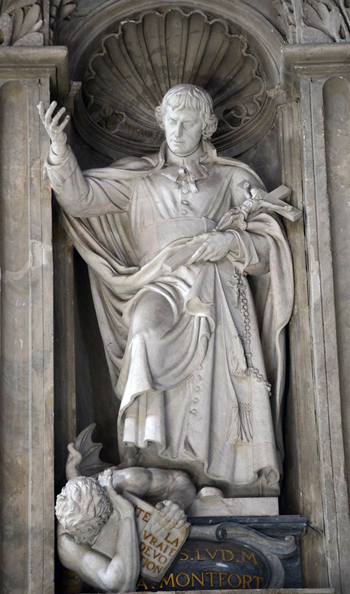 Moreover, being in complete submission to the laws of the Church, they shunned all intercourse with the Illuminati or Carbonari, and despised or feared alike the doctrines of the socialist or nihilist. When the revolutionary movement began to be felt in France, these people remained tranquilly in their homes unallured by visions of false liberty and willing in all sincerity to render to Caesar that which is Caesar's.
Moreover, being in complete submission to the laws of the Church, they shunned all intercourse with the Illuminati or Carbonari, and despised or feared alike the doctrines of the socialist or nihilist. When the revolutionary movement began to be felt in France, these people remained tranquilly in their homes unallured by visions of false liberty and willing in all sincerity to render to Caesar that which is Caesar's.
Yet, when the first rumblings of the storm began to be heard in La Vendée, the peasants in their cabins around their fires of peat began to whisper the legend which had come down to them from their fathers. It was said that once the Blessed Louis Grignon de Montfort, founder of the missionaries of St. Laurent-sur-Sèvre, came to preach a mission in Bressuire.
When the mission was over and the priest about to depart, he stood a moment in deep thought before a large stone cross. Suddenly he cried out: "Brethren, for the punishment of sinners God will one day send into all this region a horrible war. Blood shall be shed; men shall be slain; the whole country shall be ravaged. These things shall come to pass when my cross is covered with moss."
The holy missionary departed; the hymns that had been sung at the mission service died away upon the Vendean air; but deep down in the hearts of the people dwelt this prophecy. Years passed on silently and swiftly. Old men alone remembered the preacher's words, and in many a fireside chat related it to their children and their children's children.
All the while the soft green moss was stealing up the stony sides of the cross, covering it quietly, noiselessly and surely, as time covers the surface of the earth with new-made graves. People passing the cross began to mutter with ominous shake of the head that the moss was creeping up. In 1793, when the storm began to burst over the land, the cross stood completely covered as in a garment of velvet green.
Henri de la Rochejaquelein enters the field
Undismayed by the failure of their first rising at Bressuire, for the men of the Vendée has risen, roused by the danger of their King to take part in the deadly struggle that was raging throughout France, the peasantry began to look abroad for leaders. Bonchamps, Charette, Stoffle and d'Elbée appeared upon the scene. In the center of the Bocage territory were numbers of royalists willing and even anxious to strike a blow in the good cause, if they only had a leader.
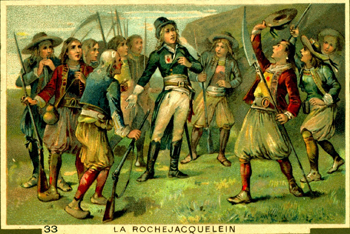 La Rochejaquelein had meanwhile come out of his retirement at Clisson and joined the forces of Bonchamps and d'Elbée. Perceiving the need of a general rising in that portion of the country between Tiffanges and Chatillon, of which we have already spoken, he hastened to his own Castle of St. Aubin to place himself at the head of the retainers and tenantry of his house. Badly armed, miserably undisciplined, poorly provisioned, they were wanting in everything but courage, trust in God and a firm belief in the justice of their cause.
La Rochejaquelein had meanwhile come out of his retirement at Clisson and joined the forces of Bonchamps and d'Elbée. Perceiving the need of a general rising in that portion of the country between Tiffanges and Chatillon, of which we have already spoken, he hastened to his own Castle of St. Aubin to place himself at the head of the retainers and tenantry of his house. Badly armed, miserably undisciplined, poorly provisioned, they were wanting in everything but courage, trust in God and a firm belief in the justice of their cause.
Of these forces la Rochejaquelein now took command and marched at once to Aubiers, where the republicans had entrenched themselves.
Before setting out the young leader made a soul-stirring address to his soldiers, concluding with the immortal words: "My friends, if my father were here, you would have confidence in him. I am only a boy, but by my courage I will show myself worthy to command you. If I advance, follow me; if I flinch, cut me down; if I fall, avenge me!"
Loud and prolonged was the applause which greeted the boy orator, for at this time our hero was scarcely 20 years of age. Full of enthusiasm, his soldiers called upon him to lead them to Aubiers, where a party of revolutionary republicans were quartered.
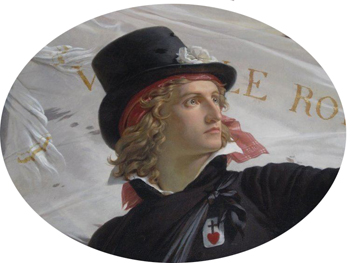 An engagement took place there on the 13th of April. The enemy's forces were under the command of the celebrated Quetineau. La Rochejaquelein placed detachments at various points of attack, where they lay concealed by hedges or shrubbery.
An engagement took place there on the 13th of April. The enemy's forces were under the command of the celebrated Quetineau. La Rochejaquelein placed detachments at various points of attack, where they lay concealed by hedges or shrubbery.
He entrenched himself with the main body of his army in a garden, whence they made an assault upon Quetineau. The republican soldiers at once fell into disorder, were defeated and obliged to retreat. Waving his sword above his head, La Rochejaquelein rushed into the very thickest of the foe, shouting, "See, the Blues are flying. Charge!"
Charge they did, and were left masters of the field, the enemy having deserted their artillery, arms and ammunition. Taking possession of these, the Vendeans hastened to Châtillon and Tiffanges, where they shared them with new volunteers who ranged themselves under la Rochejaquelein's standard.
Thus was begun in triumph that career which was destined to be so brief and glorious.
Continued
Adapted from Names that Live in Catholic Hearts by Anna Sadlier,
NY: Benzinger Bros, 1882, pp. 220-228
Posted May 3, 2021

The young Henri; below, the ruins of his Castle

His eyes were the most remarkable feature of his face: dark, and yet intensely bright, bright with that immortal spark that urged him to his high destiny of fame and early death.
He was then 16 years of age, and time had dealt gently with him. He chased the deer through the green forests of his native Poitou, beside her winding streams and over her broad fields, while friends and comrades looked with envy upon his skilful horsemanship, for which he was even then remarkable.
But the smiling landscape passed from sight. A day of horror had come for France. The leaders of the Revolution had unleashed their bloodhounds, who, fiercely following the scent, rushed abroad through the verdant fields, the pleasant homes and kingly palaces of regal France.
Thus did the terrible storm overshadowing his native land draw Henri de la Rochejaquelein forth from childhood's green and sheltered places to take his rank among its foremost defenders. The life of the King was already threatened, and our hero, inspired with the loyalty which had come down to him amongst the heirlooms of his race, hastened to Paris to enroll himself in the Constitutional Guard. But the awful 10th of August came, when Louis, who had still some faithful arms to strike a blow for God, for King and for country, gave himself up by an act of misplaced confidence, with his wife, children and attendants, into the hands of the National Assembly.
"I am come into your midst," he said, " to prevent a great crime." Alas! he could not foresee the future, when the sin of regicide would call down a deeper vengeance upon their heads. Needless to dwell upon these harrowing scenes; the poor King's trust in the affection of his people; his grief and regret when he heard a discharge of artillery directed against that cruel mob which 24 hours later condemned him, with his wife, children, and his sister, Madame Elizabeth, to the prison of the Temple. ...
Here, then, was a touching appeal to chivalry, and la Rochejaquelein felt that he must stand among the few loyal ones that formed an outwork round the King.
In Paris, however, his presence was of no avail, and so the young hero returned to Poitou, crying: "I go to my native province, whence they shall hear of me before long."
A prophetic warning
Meanwhile we shall glance at the origin of this struggle and the causes for the deep loyalty of the people of La Vendée.
The lords and commons of these Western provinces of France had always lived in perfect harmony. Hence the latter, never feeling themselves oppressed, took no part in the widespread revolt of the revolutionists. They loved and respected the King and had no abuses of which to complain regarding the nobles.

St Louis de Montfort: ‘France will be ravaged when my cross is covered with moss’
Yet, when the first rumblings of the storm began to be heard in La Vendée, the peasants in their cabins around their fires of peat began to whisper the legend which had come down to them from their fathers. It was said that once the Blessed Louis Grignon de Montfort, founder of the missionaries of St. Laurent-sur-Sèvre, came to preach a mission in Bressuire.
When the mission was over and the priest about to depart, he stood a moment in deep thought before a large stone cross. Suddenly he cried out: "Brethren, for the punishment of sinners God will one day send into all this region a horrible war. Blood shall be shed; men shall be slain; the whole country shall be ravaged. These things shall come to pass when my cross is covered with moss."
The holy missionary departed; the hymns that had been sung at the mission service died away upon the Vendean air; but deep down in the hearts of the people dwelt this prophecy. Years passed on silently and swiftly. Old men alone remembered the preacher's words, and in many a fireside chat related it to their children and their children's children.
All the while the soft green moss was stealing up the stony sides of the cross, covering it quietly, noiselessly and surely, as time covers the surface of the earth with new-made graves. People passing the cross began to mutter with ominous shake of the head that the moss was creeping up. In 1793, when the storm began to burst over the land, the cross stood completely covered as in a garment of velvet green.
Henri de la Rochejaquelein enters the field
Undismayed by the failure of their first rising at Bressuire, for the men of the Vendée has risen, roused by the danger of their King to take part in the deadly struggle that was raging throughout France, the peasantry began to look abroad for leaders. Bonchamps, Charette, Stoffle and d'Elbée appeared upon the scene. In the center of the Bocage territory were numbers of royalists willing and even anxious to strike a blow in the good cause, if they only had a leader.

The peasants and nobles rally to the call of the young leader la Rochejaquelein
Of these forces la Rochejaquelein now took command and marched at once to Aubiers, where the republicans had entrenched themselves.
Before setting out the young leader made a soul-stirring address to his soldiers, concluding with the immortal words: "My friends, if my father were here, you would have confidence in him. I am only a boy, but by my courage I will show myself worthy to command you. If I advance, follow me; if I flinch, cut me down; if I fall, avenge me!"
Loud and prolonged was the applause which greeted the boy orator, for at this time our hero was scarcely 20 years of age. Full of enthusiasm, his soldiers called upon him to lead them to Aubiers, where a party of revolutionary republicans were quartered.

If I advance, follow me; if I flinch, cut me down; if I fall, avenge me!
He entrenched himself with the main body of his army in a garden, whence they made an assault upon Quetineau. The republican soldiers at once fell into disorder, were defeated and obliged to retreat. Waving his sword above his head, La Rochejaquelein rushed into the very thickest of the foe, shouting, "See, the Blues are flying. Charge!"
Charge they did, and were left masters of the field, the enemy having deserted their artillery, arms and ammunition. Taking possession of these, the Vendeans hastened to Châtillon and Tiffanges, where they shared them with new volunteers who ranged themselves under la Rochejaquelein's standard.
Thus was begun in triumph that career which was destined to be so brief and glorious.
Continued
Adapted from Names that Live in Catholic Hearts by Anna Sadlier,
NY: Benzinger Bros, 1882, pp. 220-228
Posted May 3, 2021
______________________
______________________


